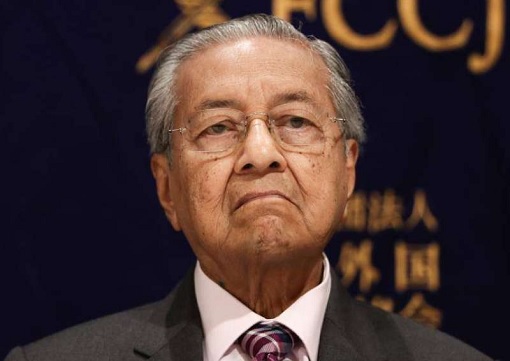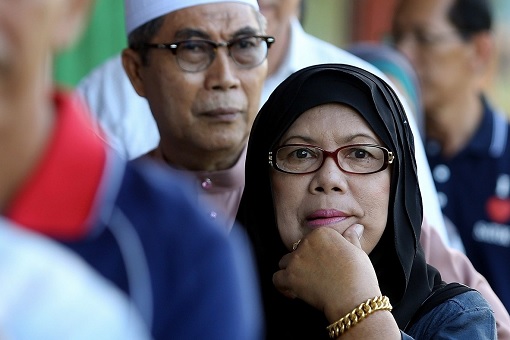BOMBSHELL – ULTIMATELY, IT’S MAHATHIR & MUHYIDDIN WHO JINXED PN – ONE WITH RACISM SO OUTRAGEOUS EVEN MALAYS GOT SCARED & THE OTHER WITH HALF-BAKED ‘FATWA’ THAT HE HIMSELF HAS U-TURNED ON – ‘BANGSA JOHOR, ANGRY & INSULTED AT BEING COMPARED WITH RURAL COUSINS FROM PAS HEARTLANDS OF KEDAH, KELANTAN & T’GANU, KICK OUT PN-PAS – PAS ‘HERO’ SANUSI NOW A LAUGHING STOCK AFTER BOASTING ‘GREEN WAVE’ WILL SWEEP INTO SINGAPORE – BUT ‘GREEN WAVE’ COULDN’T EVEN FLUSH JOHOR, MUCH LESS CROSS THE CAUSEWAY – PULAI A SLAP IN THE FACE FOR ANWAR WITH NON-MALAYS BOYCOTTING ZAHID’S DISCHARGE – ALLOWING PN TO RAISE PULAI VOTES BY 9,000 – WHILE MOSTLY-MALAY SIMPANG JERAM A SLAP IN THE FACE FOR PN-PAS, WITH PAKATAN INCREASING ITS MAJORITY BY 2,399 AGAINST A HIGHER TURNOUT OF 61% VS 55%
Opposition Perikatan Nasional’s “green wave” finally came to a screeching halt in the southern state of Johor. In spite of low voter turnout and controversial acquittal of UMNO president Zahid Hamidi, who is also the deputy prime minister, the people of Johor have decided to return both Pulai parliamentary seat and Simpang Jeram state seat to Pakatan Harapan.
Bad weather contributed to low voter turnout – only 47.33% turnout in Pulai and 60.85% in Simpang Jeram – raising an initial alarm that Pakatan Harapan could lose the seats. Pulai’s turnout in the November 2022 General Election was 70.96%, meaning a drop of voters from 117,303 to 78,453. A third – 38,850 voters (33%) – did not vote this round due to various reasons.
In Pulai, Pakatan Harapan candidate Suhaizan Kayat won with a 18,641-vote majority by polling 48,283 votes against rival Perikatan Nasional’s Zulkifli Jaafar, who managed to capture only 29,642 votes. To save face, the opposition quickly declared victory by claiming it has successfully reduced the late Salahuddin Ayub’s majority of 33,174 votes.
In the Nov 2022 national polls, Salahuddin captured 55.33% or 64,900 votes. Back then, rivals Barisan Nasional polled 31,726 votes (27.05%) and Perikatan Nasional grabbed 20,677 votes (17.63%). Retaining Pulai, Pakatan Harapan has increased its popular votes from 55.33% to 61.55%. Even though the opposition had lost, its votes have also increased from 17.63% to 37.78%.

This means Barisan Nasional, who is now a partner of Pakatan, saw its supporters split for Pakatan and Perikatan – Pakatan’s popular votes increased by 6.22% and Perikatan’s has jumped by 20.15%. Still, the opposition’s gain isn’t significant enough to change the Johor landscape. The result actually mirrors the 2018 General Election, when Salahuddin similarly won 63.81% of the popular votes.
Essentially, for every 6 Johoreans who voted for Pakatan Harapan, only three voted for the rivals. This means about two-thirds majority prefers Pakatan-led Unity Government. Pro-opposition fanatics have claimed that Pakatan’s reduced majority vote (18,641 from 33,174 votes) and Perikatan’s increased votes (20,677 to 29,642 votes) as proof that they have lost with dignity, whatever that means.
If the result of “urban” Pulai parliament seat does not convince you that the green wave (derived from Perikatan’s largest coalition party – Parti Islam SeMalaysia or PAS) has failed to breach Johor, perhaps the “semi-rural” Simpang Jeram will. In the Saturday’s polls, Pakatan retained the seat with an increased majority (3,514 from 2,399 votes).
More importantly, the state constituency populated with more rural Malays than Pulai has a higher turnout of 60.85% than last November’s national election (54.72%). Nazri Abdul Rahman of Pakatan Harapan secured 13,484 votes (an increase of 15.6% votes) in Simpang Jeram, defeating Perikatan Nasional’s Dr Mohd Mazri Yahya, who scored 10,330 votes (an increase of 12.47%).
There are three ways to decipher the results. First – the ethnic Chinese voters, most of them working in Singapore and are largely Pakatan Harapan supporters, did not return to vote. This means most of the Malay voters had voted for Pakatan instead of the Opposition. If this is true, it also means that even the conservative Malays in Johor have rejected Perikatan Nasional.
Second – the ethnic Chinese voters came out in droves to vote for Pakatan Harapan, whilst the Malay voters did not bother to vote. But if this is true, it means the Johor Malays were both angry and disillusioned with extremist beliefs and behaviours demonstrated by leaders of Perikatan Nasional. They reject racist bigot Muhyiddin Yassin and religious extremist Hadi Awang.
Like it or not, the northern Malays and the southern Malays do not see eye-to-eye about radical Islamist. Johor, thanks to its proximity to neighbouring Singapore, is more progressive, moderate and liberal than Kelantan, Terengganu, Perlis and Kedah. The green wave hits its first roadblock in Negeri Sembilan and has subsided when reaches Johor.
To make matters worse, former prime minister Mahathir Mohamad appears to have jinxed Perikatan Nasional left, right and centre. Fast losing his ability to think strategically and logically, the 98-year-old racist had predicted that the United Malays National Organization (UMNO) will “win big” if elections were to be held in 2022. Of course, UMNO “lost big”, winning only 26 seats.

The former premier claimed that Johor would be as small as the state of Perlis if Pakatan Harapan were allowed to stay in power and sell land to foreigners. He begged Johor voters to punish the unity government through the ballot box. Hilariously, he told non-Malays not to fear Perikatan Nasional – even though the minorities are being suppressed and bullied.
Bangsa Johor listened to Mahathir’s twisted arguments and happily voted against his advice. But the old man was not the only problem that contributed to the opposition’s defeat. Former backdoor PM Muhyiddin, who is Perikatan Nasional chairman and president of Bersatu (Malaysian United Indigenous Party), unilaterally issued a “political fatwa” that it would be “haram” or sinful to vote for Pakatan Harapan.
Besides pretending to be more pious than “ulamas”, Muhyiddin has even spread lies and fake news that the Anwar-led unity government would redraw the boundaries and reallocate parliamentary seats in a redelineation exercise that will increase the number of federal seats from 222 to 300. Hence, he argued that the opposition must win Pulai federal seat to deny the federal government ruling coalition a two-thirds majority.
Again, Bangsa Johor was not impressed over Muhyiddin’s religious rhetoric. In fact, it was an insult to the intelligence of the Johor people to be compared with insecure Malays in the northern part who have been scammed into believing that the Malays are losing power. His wish to get 90% Malay voters to vote for Perikatan Nasional did not materialize.
Desperate for a state as Bersatu’s power base, Muhyiddin hoped that Johor – his birth state, where he served as chief minister for nine years up to 1995 – would swing. The plan to use Pulai and Simpang Jeram as a referendum to reject the current federal administration has backfired. Rather, Bangsa Johor decided to use the twin by-elections as a referendum to reject Perikatan Nasional.
FINANCE TWITTER
.
